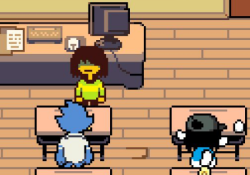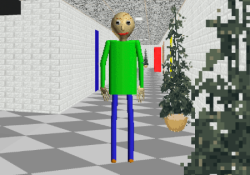Pineapple on Pizza is a short, surreal walking simulator set on an island locked in a never-ending celebration. You arrive without context, surrounded by dancing figures, looping music, and bright, inviting scenery. No one speaks. Nothing changes. The world moves to its own rhythm, and you’re simply there to witness it. What seems at first like a cheerful escape slowly becomes something more ambiguous, pushing the player to consider whether their presence has a purpose—or a cost.
A World That Doesn’t Need You
Wandering the island, you notice that every character is in motion, locked into celebration. They don’t acknowledge you. There’s no way to interact beyond movement. No hints, no tasks—just constant dancing. The music pulses endlessly, reinforcing the illusion of life, but there’s a quiet question beneath it all: what happens if you break the rhythm? One landmark stands apart from the rest: a volcano. Unlike everything else, it waits silently, untouched by the music.
Stillness After Motion
When you choose to step into the volcano, the shift is immediate and irreversible. The music stops. Every dancer freezes in place. The island becomes quiet—eerily so. There’s no message, no ending screen, no reaction from the world. The joy that seemed eternal disappears in a single action. That silence forces the player to reflect. Did they end something meaningful? Or was it an illusion all along?
Highlights of the experience:
- Open-ended exploration with no instructions
- Characters locked in animation loops
- A hidden choice that alters the game permanently
- Emphasis on contrast between movement and stillness
- A short runtime designed to provoke reflection
Letting Silence Speak
Pineapple on Pizza tells no story directly, but its structure encourages players to assign meaning to what they’ve done. Was it an act of curiosity or destruction? Does the silence represent loss, or clarity? With no dialogue or plot, the game becomes a mirror—players see in it whatever their own thoughts provide. That’s what makes it powerful: its refusal to explain becomes its invitation to think.
By blending minimal mechanics with a single, irreversible decision, Pineapple on Pizza delivers a complete emotional experience in just a few minutes. It’s a quiet reminder that even small games can ask big questions—if they’re brave enough to stay silent.































